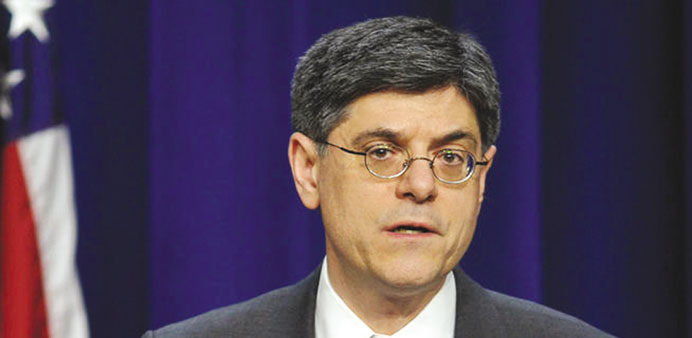Lew: ‘Congress should deal with this right away.’
Reuters/Washington
The US will not run out of room to borrow until at least early September, US Treasury Secretary Jack Lew said yesterday, citing accounting maneuvers that can be employed once a suspension of the nation’s debt limit expires next week.
“The statutory debt limit will be reached in just a few days when it expires on May 18, but because of the extraordinary measures that are available and the cash flows that we now can predict, it will not be until at least after Labour Day” that Washington will exhaust its capacity to borrow, Lew told CNBC television.
The US Labour Day holiday falls on September 2.
Congress earlier this year suspended the nation’s borrowing cap through May 18, temporarily removing the risk of a US debt default. The US Treasury Department can continue borrowing for several months by using unusual measures that include shifting funds among government accounts.
Lew urged lawmakers to move quickly to raise the debt ceiling, saying a failure to do so could foster uncertainty that would hurt both the US and the global economy.
“Congress should deal with this right away. The fact that they have more time should not put off dealing with this,” he said.
“I don’t think that it’s in the interests of the US or the world economy for Congress to wait until the last minute and create a sense of anxiety.”
If Congress does not raise the borrowing cap, the government eventually would run out of funds to pay its bills, including interest on its bonds, leading to a damaging debt default. Republicans plan to use the need to raise the debt limit as leverage to seek fresh budget cuts and changes to the tax code.
Lew’s prediction that extraordinary actions could enable the nation to borrow at least into September appears somewhat conservative compared to some private forecasters.
Many private forecaster say it appears likely that the debt limit will not become binding until some time in October given unexpectedly strong tax receipts and sizable bailout payments from mortgage finance firms Fannie Mae and Freddie Mac.
Fannie Mae said on Thursday it will pay $59.4bn in dividends to the US Treasury by June 30 after a record profit in the first quarter that reflected a multi-billion-dollar tax-related windfall.
A day earlier, Freddie Mac said it would send $7bn to the Treasury in June and that it was considering booking a $30.1bn tax-related gain that would also go into the government’s coffers.

